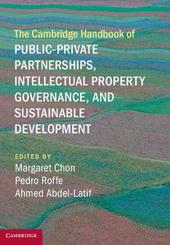
|
The Cambridge Handbook of Public-Private Partnerships, Intellectual Property Governance, and Sustainable Development
Hardback
Main Details
| Title |
The Cambridge Handbook of Public-Private Partnerships, Intellectual Property Governance, and Sustainable Development
|
| Authors and Contributors |
Edited by Margaret Chon
|
|
Edited by Pedro Roffe
|
|
Edited by Ahmed Abdel-Latif
|
| Series | Cambridge Law Handbooks |
|---|
| Physical Properties |
| Format:Hardback | | Pages:462 | | Dimensions(mm): Height 261,Width 183 |
|
| ISBN/Barcode |
9781107175839
|
| Classifications | Dewey:346.048 |
|---|
| Audience | | Professional & Vocational | |
|---|
| Illustrations |
Worked examples or Exercises; 3 Tables, black and white; 13 Halftones, black and white; 1 Line drawings, black and white
|
|
Publishing Details |
| Publisher |
Cambridge University Press
|
| Imprint |
Cambridge University Press
|
| Publication Date |
20 September 2018 |
| Publication Country |
United Kingdom
|
Description
Public-private partnerships (PPPs) play an increasingly prominent role in addressing global development challenges. United Nations agencies and other organizations are relying on PPPs to improve global health, facilitate access to scientific information, and encourage the diffusion of climate change technologies. For this reason, the 2030 Agenda for Sustainable Development highlights their centrality in the implementation of the Sustainable Development Goals (SDGs). At the same time, the intellectual property dimensions and implications of these efforts remain under-examined. Through selective case studies, this illuminating work contributes to a better understanding of the relationships between PPPs and intellectual property considered within a global knowledge governance framework, that includes innovation, capacity-building, technological learning, and diffusion. Linking global governance of knowledge via intellectual property to the SDGs, this is the first book to chart the activities of PPPs at this important nexus.
Author Biography
Margaret Chon is the Donald and Lynda Horowitz Professor for the Pursuit of Justice, and former Associate Dean for Research at Seattle University School of Law, where her current research explores the relationship of intellectual property to human and sustainable development. Pedro Roffe is a Senior Fellow at the International Centre for Trade and Sustainable Development, where his work focuses on intellectual property, foreign investment, transfer of technology and international economic negotiations. Ahmed Abdel-Latif is the Chief, Office of the Director General, at the International Renewable Energy Agency. Previously, he was Senior Programme Manager for Innovation, Technology and Intellectual Property at the International Centre for Trade and Sustainable Development.
Reviews'At a time in which prospects for normative and technical assistance initiatives to address access to public goods have been overwhelmed by new challenges arising from globalization, digitization, and the failure of multilateralism, this book offers a careful study of public-private partnerships (PPPs) in a variety of sectors, using case studies that offer guidance to policymakers, raise new questions for scholars, and, collectively, outline the contours of new pathways in the design and governance of PPPs, with a distinctive path to advancing access to knowledge and access to technology. The book is a should have - and a must read.' Ruth Okediji, Harvard Law School and the Berkman Klein Center, Massachusetts 'This timely publication explores the complex linkages between the broad policy context defined by the Sustainable Development Goals (SDGs), and the concrete task of using the intellectual property (IP) system to forge practical partnerships that yield tangible results, examined through the lens of how IP rights are managed within a diverse selection of public-private partnerships. In distilling practical and policy insights from this rich vein of experience, and analysing equally diverse approaches to managing IP rights to leverage public benefit, this landmark volume opens up possibilities for a more nuanced, more grounded and more enabling understanding for policymakers of the complex roles and potential contributions of the IP system in efforts to achieve the SDGs; and it equally provides direct guidance for those engaged in the practical planning and management of knowledge-based programmes for sustainable development marks a substantial advance towards the informed and empirically grounded inquiry.' Antony Taubman, World Trade Organization 'This timely book covers a very important trio of topics, and is a 'must-read' for anyone interested in current issues relating to intellectual property and its broader social and developmental goals.' Edward Kwakwa, World Intellectual Property Organization 'The twenty first century will be increasingly driven by the globalization of knowledge goods. How should intellectual property be governed in public-private partnerships if they are to comply with sustainable development goals? This impressive collection brings together concrete experiences to draw lessons for future directions in global governance of knowledge.' Sakiko Fukuda-Parr, The New School, New York 'This book makes a long overdue contribution to the understanding of public-private partnerships (PPPs) and their role in global knowledge governance. PPPs are often found on the intersection of private intellectual property and public interest. Their variety is as plentiful as the views expressed in this book which makes it a must read for anyone interested in the question of whether PPPs address intellectual property and development challenges effectively or worsen them.' Ellen 't Hoen, Medicines Law and Policy and Global Health Unit, University of Groningen, The Netherlands '...offer[s] a fresh insight into one of the biggest issues we face today in global development challenges.' Elizabeth Robson Taylor, Phillip Taylor, The Barrister
|